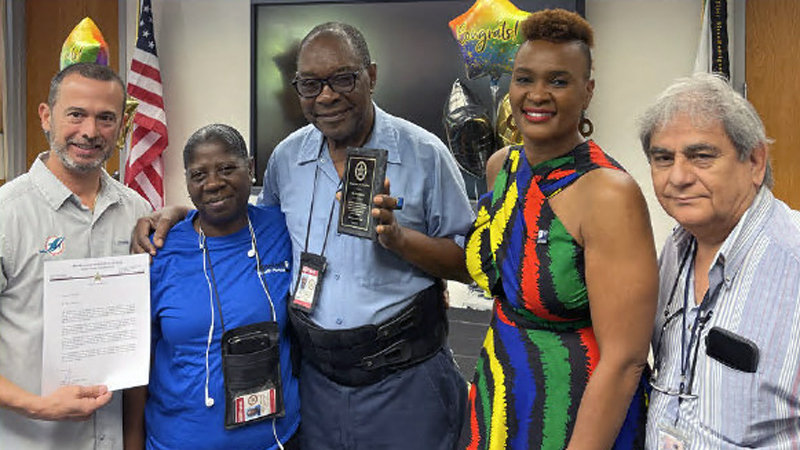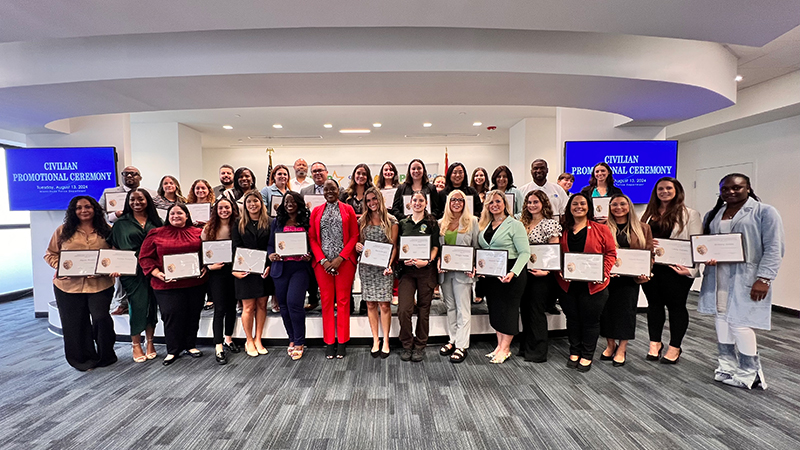-
News & Social Media
-
Create a new miamidade.gov account
A miamidade.gov profile allows you to link to your Water and Sewer customer account, as well as subscribe to a variety of news and alert services.
Receive weekly news & events, public notices, recycling reminders, grant opportunities, emergency alerts, transit rider alerts and more.
-
-
Employee Information
-
My Employee Portal
Employees can login to access personnel information, workplace tools, trainings and more.

-
New Sheriff Reflects on Career Journey, Family and Priorities for Miami-Dade Sheriff’s Office

In her speech to 39 women who graduated from the inaugural class of the Women’s Leadership Academy on April 11, 2024, then Assistant Director Rosie Cordero-Stutz borrowed a phrase from an accomplished author to offer them career advice. “I want to challenge all the students of this class to remember this quote, as you depart with all your new wisdom, into your future bright careers, in the words of Laurel Ulrich, a Pulitzer Prize-winning author, well-behaved women seldom make history,” she said.
Sheriff Cordero-Stutz made history on Tuesday, November 5, 2024, becoming the first Hispanic woman elected sheriff in the state’s history, and the first woman elected sheriff in Miami-Dade County history. It was a remarkable ascension for the sheriff, who joined the department in 1996. She was sworn in on January 7, 2025, overseeing the newly created Miami-Dade Sheriff’s Office (MDSO).
Her journey is nothing short of remarkable. Born to a Dominican immigrant mother who raised her in the gritty Washington Heights neighborhood in Manhattan, and later in Flushing, Queens, New York City, she learned resilience and determination early, traits that would define her 28-year career in law enforcement. She joined the Miami-Dade Police Department in 1996 as a patrol officer in the Northside District and steadily climbed the ranks, serving in diverse and demanding roles—homicide detective, robbery intervention detail, internal affairs, and major of the Robbery Bureau. With the Robbery Bureau, she oversaw a 24 percent decline in robberies, a dramatic drop that she attributed to “good old-fashioned Barney Miller police work.”
She went on to become North Operations Division chief, helping to lead the department through a series of challenges, including the COVID-19 pandemic, civil unrest, and the tragic Surfside building collapse. Then, as assistant director, her list of responsibilities grew, but it was a job that she had prepared for her entire life. She credits her parents, particularly her mother, for instilling in her a strong work ethic and an attitude that she should not let others define her limitations but strive to do the best at whatever she set out to achieve.
As a ten-year-old growing up in a largely Dominican neighborhood in Washington Heights, she prepped her mother to take the U.S. citizenship test, quizzing her on the names of U.S. presidents, the First Amendment, the branches of government, and other facts. As a newly minted citizen, her mother took on numerous jobs to provide for the family. Her parents divorced, and her father relocated to South Florida. Her mother moved out of Washington Heights, which was overrun with crime and besieged by the crack-cocaine epidemic, to Flushing, Queens. The public high school in their new neighborhood was much better.
Sheriff Cordero-Stutz worked as a sales associate at Thom McAn Shoes in New York City, a job that she held from high school through graduation from Marist College, a small liberal arts college in Poughkeepsie, New York. She majored in criminal justice and was required to complete two internships to graduate. Her first one was with a district attorney’s office, where she was attached to investigations. The second one was at a minimum-security federal prison. Through those experiences, she learned that she loved investigative work.
“I knew that I wanted to stay in law enforcement over corrections because one thing I love about policing, you’re never doing the exact same thing every day,” she said.
After graduating from Marist, Sheriff Cordero-Stutz continued working in retail at The Limited. She had visited her father in Miami numerous times and fell in love with the region, so much so that she decided she wanted to relocate to Miami. At her job, she put in for a transfer, and it was approved. She moved to Miami and started working for The Limited and H2O Plus at the Dadeland Mall. She was enrolled in management and training programs at both jobs. She was also applying to federal law enforcement agencies, including the FBI and DEA.
The application process was lengthy, convoluted, and required travel. “It was not going the way I wanted it to go, and at a point, I told myself to stop and reassess things. I knew I still wanted to do policing, and for me, the only place that I wanted to work at was the Miami-Dade Police Department.” She applied and then waited. It took two years for her to be accepted to be a member of Basic Law Enforcement Class 176 in 1996. She was appointed class leader. “I had worked retail for many years, and part of my job was management, so I had already developed those skills when I entered the academy,” Sheriff Cordero-Stutz said.
Her first assignment after the academy was as a patrol officer in the Northside District. “I fell in love with patrol. There were moments when you arrive at a location and you’re able to help people in their darkest moments, diffusing situations.” She said her ability to connect to people and resolve disputes stems from lessons learned from her mother.
“I would think about everything she went through. She was the eldest daughter of 13 siblings and paved the way for her siblings. She came to this country legally and then sponsored 12 of her siblings to come here. My cousins, I have so many of them, and they are all good citizens, professionals. There is a recipe there; this country allows for anyone who wants to achieve, to do so, to create opportunities rather than continue to cry about not getting any. Honestly, some of the best lessons I learned in life came because I didn’t get opportunities. I didn’t let that stop me; I just found another way, and that was instilled in me by my mother.”
At the Northside District, she was involved in numerous chases of suspects, in cars and on foot, often having to jump over fences and other obstacles to subdue individuals who refused to give up. As a member of the Priority Response Unit in the Northside District, she and a partner were assigned to find a subject wanted for murder. They found him walking on a street. The suspect resisted arrest. “It was a heck of a fight,” she said.
She carries with her the experience of responding to a domestic situation in which a mother suffering from mental illness was raising a family in abject squalor. “Her 12-year-old child basically became the de facto adult of the household, thrust into adulthood and responsibility that never should have been part of his experience as a child.”
Her shift to a supervisory role came after she passed the sergeant’s exam in 2004 and went to the Robbery Intervention Detail. She had previous experience with RID, but in her return, she was leading other officers. “I felt like I had given a lot of myself, and it was time to contribute in a different way.” While assigned to RID, she attended graduate school part-time and earned a master’s degree in public administration, with a certification in human resources.
Later assigned to the Homicide Bureau, she “lived, breathed, and slept homicide cases.” At the time she was single and did not have any children, so she poured herself into her job. “It was obviously important work, giving closure to the families of victims and helping those who no longer had a voice.” She spent five years in the bureau.
“Experience matters, it truly matters, because every one of our officers, or deputies, can take a person’s civil rights away in our duty to protect the public, and in that role, sometimes very bad things can happen,” she said. “We’ve been blessed here. Turn on the news and pay attention to some other departments; we don’t have those issues here because of our relationship with the community and the fact that we continually learn from our experiences. We have a rich history of having done things well.”
As sheriff, she plans to focus on continuing to promote the department’s close connection with the community it patrols, and emphasizing the importance of “culture.”
“We will strive to project it internally and outwardly. Service is a key motto of mine. We’ve had a few rough years, but we want to continually remind ourselves of the culture that has been established here.”
Her Dominican culture is also a source of immense pride, and she has been a shining role model for her community. On November 13, 2021, the Dominican Law Enforcement Officers of Florida named her their “Woman of the Year” during their annual gala. “What it means to me is that I’m acknowledged by not just my fellow law enforcement brothers and sisters, but by my Dominican law enforcement brothers and sisters,” she said in her acceptance speech back then.
Her decision to announce her candidacy for sheriff came after deep consideration with her family and with co-workers. As the pool of candidates grew, and the deadline to declare approached, she thought that the department could be better served by a high-ranking leader with vast experience and the ability to connect with the community. Her life had prepared her for the role, and when several of her co-workers suggested to her that she had the background to lead the department, she began to seriously consider running. It was after a conversation with her husband, who retired from the department after 35 years, that she decided to run. Her husband told her that the department needed her expertise at a pivotal time in its history, and that she should answer the call to usher in the Miami-Dade Sheriff’s Office as its leader.
“The whole process, to becoming elected, it was hard, probably the hardest thing I’ve ever done in my life.”
Leaving Miami-Dade County
You are now leaving the official website of Miami-Dade County government. Please be aware that when you exit this site, you are no longer protected by our privacy or security policies. Miami-Dade County is not responsible for the content provided on linked sites. The provision of links to these external sites does not constitute an endorsement.
Please click 'OK' to be sent to the new site, or Click 'Cancel' to go back.





